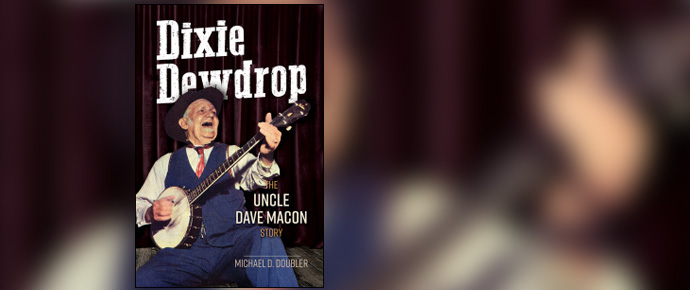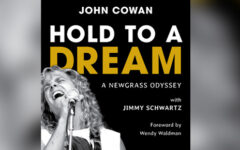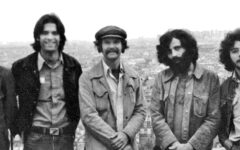
One of early Country music’s most flamboyant characters was Uncle Dave Macon, born David Harrison Macon, but better-known as “The Dixie Dewdrop.”
Known for his chin whiskers, plug hat, gold teeth and gates-ajar collar – old-time banjo player, singer, songwriter and comedian – Uncle Dave Macon was a natural showman. He was the first real star of WSM’s Grand Ole Opry, albeit that he didn’t perform professionally until he was turned 50 years of age.
All this said, Uncle Dave is more than a very suitable candidate for a biography and nobody is more appropriate to document his life than family member Michael D Doubler, already the author of six books.
In Dixie Dewdrop: The Uncle Dave Macon Story (University of Illinois Press) Doubler looks at (a) his love for music, which began at the age of 13 and continued until his death, aged 81; (b) his love for family, especially his wife, Miss Tildy; (c) his struggle with an addiction to alcohol; (d) and his faith in God.
Bluegrass Today spoke to the author to learn more.
The UIP website mentions that you’re the great-grandson of Uncle Dave Macon. Did you ever meet him? If so, what impressions do you have of him?
“Uncle Dave passed away in 1952, three years before I was born. However, the family ties were strong while I was growing up. My mother, Mary Macon Doubler, was the daughter of Uncle Dave’s oldest son, Archie. He was the son that perhaps had the closest relations with his father (Uncle Dave had seven sons), so my grandfather had legions of Uncle Dave stories that he shared with our family. Many of those have never been heard before and are included in Dixie Dewdrop. They are more than funny yarns; most of them reveal some aspect of Uncle Dave’s life and character.
Dave Macon was a complex man who fulfilled many roles throughout his life. His life was based on simple principles: dedication to family and friends, hard work, a love of music, a near compulsive need to entertain, and the teachings of the Holy Bible. All of these things worked together to keep him in the limelight and at the top of the entertainment game for decades. At the same time, he struggled for much of his life against alcoholism and depression, and I address those matters directly in the narrative.
One thing I’ve learned through the years; each Uncle Dave fan has a favorite story about the Grand Ole Man of the Grand Ole Opry. As Uncle Dave’s biographer, I took on the task of sorting through many of those to determine if and when they actually occurred and under what circumstances. Dixie Dewdrop includes a plethora of new Uncle Dave stories for his fans.”
The inevitable questions; what prompted you to write about him and when was that?
“Great question! Luckily, I came to the project with an established reputation not only as a family member but as a scholar, researcher and published author. Eventually so many people asked me an obvious question: why don’t you write a biography of Uncle Dave? To be honest, I shied away from the project for years, as my field of expertise was military history. I began reading more about Uncle Dave, and over time, became convinced that his complete life’s story was so compelling that it had to be told.
There is not that much written about Uncle Dave compared to most other Opry stars, and to be honest, many of those accounts are less than fully accurate. In addition, the number of people who knew Uncle Dave and had personal memories of him was rapidly dwindling. I realized that those people had to be interviewed and their memories recorded sooner rather than later.
So I started the project in earnest in 2013 and completed the final manuscript in early 2017. I used the occasion of the biography to draw all the sources and materials on Uncle Dave into one place, to correct the record, and to add the plethora of new information and source materials I had gathered. For the first time, readers will learn of all the direct, personal influences on Uncle Dave’s life and career, and before now, most of those are completely unknown. I really believe that there is something new about Uncle Dave Macon on every page of the book.”
I note that you and your brother, John, published a booklet of Uncle Dave Macon photographs in 2014. That would have brought your great-grandfather back into the public eye at the time; how well do you feel Uncle Dave and his music is remembered?
“One of the most gratifying aspects of the project was that no matter who was approached—whether individuals or institutions—I was greeted with great enthusiasm and interest in the Dixie Dewdrop’s life and career. As a great-grandson of Uncle Dave, those genuine reactions were not only personally gratifying, but informed me over and over of the great appeal and interest which still exists for Uncle Dave’s reputation and music. On so many occasions, people told me how much they enjoyed my great-grandfather’s music, even while freely admitting that they knew little or nothing about his actual life. Many music festivals today still ring with Uncle Dave favorites, such as Travelin’ Down the Road, Rock About My Sara Jane, Bake That Chicken Pie and Chewin’ Gum. One contemporary testimony to Uncle Dave’s enduring popularity, and his importance to the history of country music, is that he is one of the performers featured in the first episode of Country Music, the major Ken Burns documentary debuting in the fall of 2019.”
Being a relative, you didn’t have any problems in finding detailed information and documentation about your great-grandfather?
“Living here in Middle Tennessee paid great dividends during the project. I gained access to individuals and information locally and was able to document it all. A number of previously unexploited resources, including church and cemetery records, public land and tax records, and articles from local magazines and newspapers from the 1920s and 1930s added a new, important dimension to the story. Interviews with surviving members of Uncle Dave’s family were essential, as was an extensive, informative interview with Uncle Dave’s housekeeper, a woman who had lived with the Macons for seven years and had never before been interviewed. Her story was simply unbelievable!
A mother lode of information came from the Dr. Charles K. Wolfe Collection, housed at the Center for Popular Music at Middle Tennessee State University. Throughout the 1970s and 1980s, Dr. Wolfe interviewed many entertainers who travelled with and played with Uncle Dave. (“He didn’t play with you; you played with him,” Kirk McGee quipped about Uncle Dave’s stage manner.) Those multiple, extensive interviews, in a very real sense, formed the spine of the story.”
Dixie Dewdrop: The Uncle Dave Macon Story
Scheduled for publication on September 15, 2018.
Paperback: 288 pages
Publisher: University of Illinois Press (Music in American Life)
Language: English
ISBN-10: 0252083652
ISBN-13: 978-0252083655
Product Dimensions: 15.2 cm x 22.9 cm
Dixie Dewdrop is dedicated to the author’s mother.
Publication of this book is supported by the Dragan Plamenac Endowment of the American Musicological Society, funded in part by the National Endowment for the Humanities; the Andrew W. Mellon Foundation; and by the Judith McCulloh Endowment for American Music.
The Judith McCulloh Fund for American Music was established in the spring of 2017 in memory of long-time University of Illinois Press editor Judith McCulloh. Her academic passions and keen eye as an editor put the University of Illinois Press on the map as the leading publisher in the field with the path-breaking series Music in American Life.
A contribution to the Judith McCulloh Fund for American Music can be made online.







